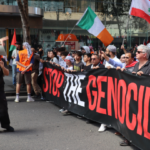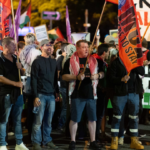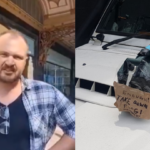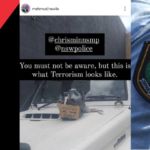NSW Police Officers Raid Pro-Palestinian Man Over Misunderstood Tweet
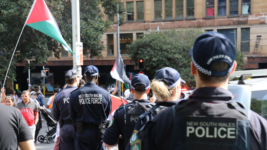
Waterloo resident Shayne Chester was startled by a banging on his front door a little after 2 pm on Thursday, 28 March, so he opened it. And around 20 NSW police officers rushed in through the front entrance and, as well, the back. The officers then set about racing into rooms and calling out “clear”.
Chester wasn’t expecting such an episode, especially as he hadn’t been out breaking any laws in a serious manner that would warrant such an intervention. However, by the end of the intrusion, he had been reassured that he hadn’t committed any serious offences, rather he’d sent a tweet.
Indeed, Chester, a Muslim Anglo Australian artist, had been reading the Quran when the NSW police executed a digital evidence access order, which allowed them to seize his phone, computer and laptop, demand the passwords and take them to the cop shop to search over the suspect tweet.
The reason the 26 March post led to the raid is that Chester compared the attention being given to a rights complaint lodged with a tribunal by a key Australian Zionist organisation over alleged hate statements, to the go-slow tactics employed to a Botany bomb threat against a pro-Palestinian man.
So, in making this statement on X, coupled with an inability of NSW police to understand the context despite the reference to the Botany incident, Chester learnt that for certain tweets, one can be pinned against a wall, watch their place be ransacked and then be left alone, uncharged, to clean up.
Tweets worth raiding for
“I don’t really understand why any of this is happening,” Chester told Sydney Criminal Lawyers on Wednesday. “And I can only make the presumption that it’s an attempt at intimidation.”
“I’ve lodged an FOI to find out who lodged that order and then to find out from them, why. What was behind it? What was their agenda?” added the 69-year-old disability pensioner, who was raided in his social housing home.
Using abbreviations and the 280 character tweet limit, Chester explained that the Executive Council of Australian Jewry had lodged a complaint with the Australian Human Rights Commission in regard to two western Sydney imams having referred to Jewish people as “vile” and as “rats”.
ECAJ co-chief executive Alex Ryvchin told Peta Credlin on Sky on 25 March that in among heightened community tensions over Gaza, two imams had been making hate filled sermons, but as no police action had taken place, he’d had to take matters into his own hands and contacted the AHRC.
Chester retorted in regard to this Sky News report within that same tweet, “You’re lucky no one left a petrol bomb at your family home #alexryvchin”, which was in reference to a January incident that had again recently been in the media regarding a downplayed bomb threat against a pro-Palestinian.
But when NSW police ransacked his home, Chester was unaware as to why three officers had him pinned against the wall, until one of the detectives explained that there had been an accusation that he had made a bomb, and they then produced a copy of the tweet.
From there, Chester, who’s an oil painter, attempted to point out to the attending officers that the line in the tweet citing a bomb was a reference to an incident, again in the press last week, involving a man flying a Palestinian flag at his Botany home, having his life threatened for doing so.
Brave new warrant system
NSW police executed a digital evidence access order under the laws contained within part 5 division 4A of the Law Enforcement (Powers and Responsibilities) Act 2002 (NSW), which is commonly referred as the LEPRA.
The Perrottet government enacted this new warrant system in October 2022, and it provides police with the ability to demand people to hand over the passwords to access their devices, and if the order isn’t complied with, then the subject faces up to 5 years in prison and/or a fine of $11,000.
The warrant for Chester, however, wasn’t in regard to a bomb, as it was issued in relation to section 93Z of the Crimes Act 1900 (NSW), for the offence of publicly threatening or inciting violence on grounds of race, religion, sexual orientation, gender identity or intersex or HIV/AIDS status.
This is the law against hate speech that the Minns government toughed late last year, via the removal of the requirement that the NSW Director of Public Prosecutions (DPP) had to sign off on any prosecution of this offence.
The issue NSW premier Chris Minns had with the law was that no one had been prosecuted under it. This became a problem after an incident at the Opera House last October, which involved a small group allegedly chanting “gas the Jews” captured on footage, which was later found to be doctored.
This led to calls being made for tougher laws, even though the small group of chanters, whom the organisers of a larger demonstration asked to leave, didn’t make the “gas” slur but rather made remarks like “fuck the Jews”, which, it’s considered, wouldn’t trigger the criminal threshold.
However, Minns toughened the law, by removing the safeguard, and now civilians are being raided in relation to tweets and then not being charged over anything.
No bomb here, just an explosive device
“The Zionists, as in my case and his, they remain clandestine, subterfuge and secret,” Chester said in relation to whoever lodged the complaint that resulted in the raid of his home, as well as referring to the case of Theo in Botany, who had a homemade bomb left on the bonnet of his ute in his carport.
The explosive device comprised of a jerry can, partially filled with petrol, with a rag hanging out the opening, bolts were taped to the side, and a lighter was attached to it. The bomb had been sitting there for some time when Theo, who’s kept his last name to himself, found it on 5 January.
A note attached to the device read, “Enough! Take down flag! One chance!!!”. And the bomb squad spent a number of hours inspecting it.
As it turns out the bomb with an accompanying death threat were left in Theo’s driveway due to his having flown a Palestinian flag in front of his home in support of the Palestinian people, who are being slaughtered by Israel: a simple gesture for a crime he is being made to bear witness to.
And as Theo explained in an SCL interview last week, NSW police placed a constable on the job, not the terrorist unit, and nothing happened, despite the fact that they were aware that Israeli man David Wise had been around the premises where the bomb was left, spouting Zionist rhetoric.
Then the clincher came as Wise was taken into custody, and as Theo described it, was undercharged with one count of send article to cause alarm, two of stalk/intimate, another count of use carriage service to menace, harass or cause offence, and a further charge of unlawfully enter inclosed land.
None of these charged offences, however, reflect the terrorist nature of the crime. “So, the fact that the charges against Wise were what they were seems bizarre,” explained Theo.
“I’m very concerned that it creates tacit permission to many other people that have been making threats and attacks towards Palestinians and their supporters,” he said, adding that it’s a civil rights issue.
Both Theo and Chester said they have had no issue with the police officers they’ve been involved with. But they wonder why the interactions they’ve had with the NSW police have transpired with such starkly different forms of urgency applied to each case.
Theo managed to mount a community campaign early last week, which saw constituents contacting various agencies calling for the incident to be taken more seriously, and on the day that Wise was supposed to plead guilty to the lesser charges, the case was referred to the Commonwealth DPP.
According to Theo, the reason he had so much support in the community was that a lot of people are scared that a bomb was left at his place and no urgency was given to the threatening behaviour. And when taken together with Chester’s case, there’s some unfamiliar patterns being reflected.
But the 280 characters of a tweet can be misinterpreted. And at those times, one can expect the police to bash on the door, raid one’s premises and confiscate any devices found to search them for evidence of any alleged hate speech that is already present in a tweet posted online.


